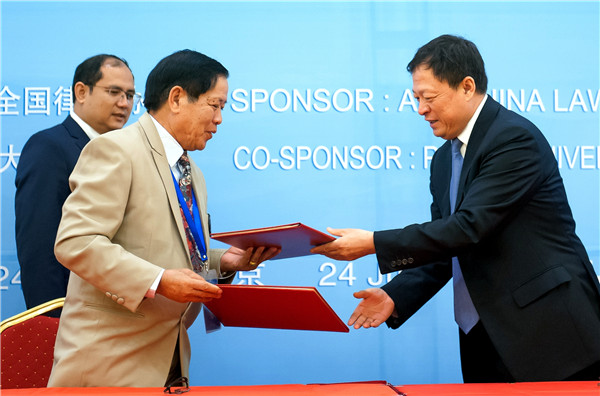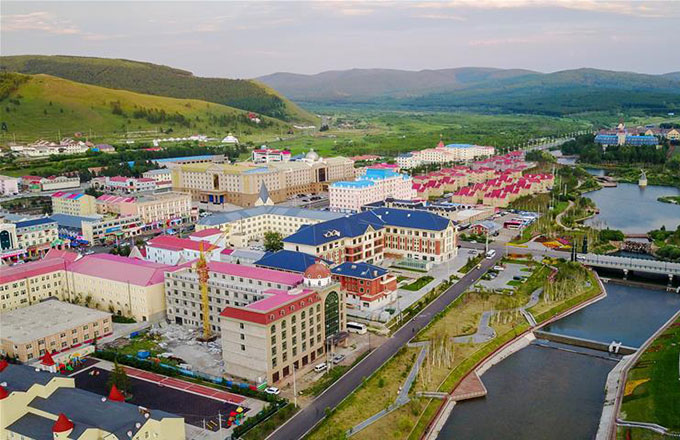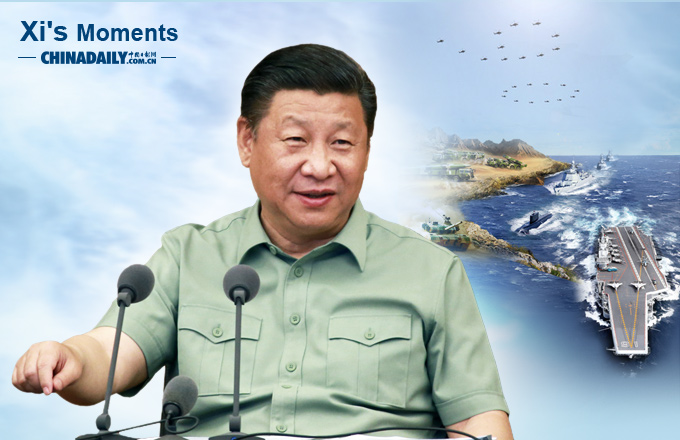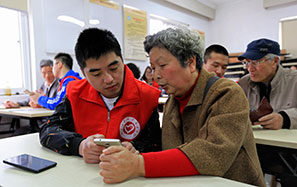Lawyers work to resolve cross-border disputes
 |
|
Representatives of the All China Lawyers' Association and the Laos Bar Association sign a memo on the provision of legal services at the forum in Beijing.[Photo by Wang Jianjun/For China Daily] |
Professional support
In 2013, President Xi Jinping proposed the Silk Road Economic Belt and the 21st Century Maritime Silk Road, known together as the Belt and Road Initiative.
As an active exploration of a new model of international cooperation and global governance, the initiative embodies development, cooperation and mutual benefit.
According to Xiong Xuanguo, vice-minister of justice, since 2013, the trade volume between China and participating countries has increased greatly, but legal services have "lagged far behind the practical needs required for social and economic development".
Statistics from the Ministry of Commerce show that last year, the total import and export volume between China and the 65 participating countries reached 6.3 billion yuan ($940 million), while Chinese investment in those countries was $14.5 billion.
Chinese businesses also established 56 economic and trade cooperation zones in more than 20 participating countries, with a total investment value of more than $18.5 billion. That generated $1.1 billion in tax revenues and created about 180,000 new jobs in participating countries.
He Yong, secretary-general of the lawyer's association, said cooperation between Chinese lawyers and their foreign counterparts will "offer professional legal support, including dealing with lawsuits and offering legal advice to their clients, and boost trade and promote international economic and cultural exchanges".
According to the Ministry of Justice, a typical example occurred in March last year, although it declined to name the parties involved.
The ministry said a State-owned company which makes safety and monitoring equipment in Beijing signed an investment agreement related to research and development with a technology company in Israel.
The Israeli company claimed to have bought the rights to a mature technology and had also obtained a patent license granted by local authorities.
The Chinese side hired the Beijing Globe-Law Law Firm to conduct a survey of the Israeli company to ensure its authenticity, the application of the technology and its ownership rights in the Chinese market.
"We sought assistance from our counterparts at leading Israeli law firms who specialize in intellectual property protection and are familiar with Israeli law and legal procedures. They were able to collect information or connect with relevant local authorities to offer valuable information," said Wang Zhengzhi, a senior partner at Beijing Globe-Law.
The Israeli lawyers discovered that the company had not obtained patents issued by Israel's intellectual property protection authorities, and its technology was not as mature as claimed.
Last month, concerned that it might face risks if it invested in the technology, the Chinese company consulted lawyers. As a result, it decided to revise the agreement and invest in several stages, based on the project's technological research and development.
"Professional legal support will play an essential role in helping businesses to take the initiative in negotiations and make the correct business decisions and then maximize their commercial interests," Wang Zhengzhi said.






















